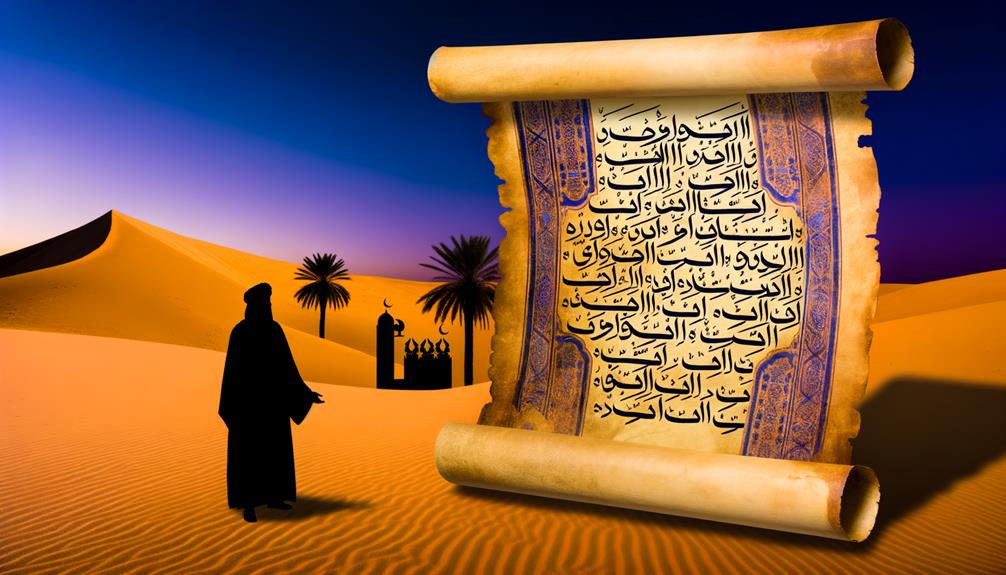Gaddafi Name Meaning in English
The name 'Gaddafi' originates from the Arabic term 'qadhdhāf,' which translates to 'archer' or 'thrower.' It derives from the verb 'qadāfa,' meaning 'he who throws,' indicating a historical association with skill in archery or throwing. The name is famously linked to Muammar Gaddafi, Libya's leader from 1969 to 2011, whose governance dramatically impacted the nation's socio-political landscape.
This Arabic name echoes a complex heritage influenced by regional and cultural nuances. To truly grasp its significance and variations, one must consider the broader historical and linguistic context.

Key Takeaways
- The name 'Gaddafi' originates from the Arabic 'qadhdhāf,' meaning 'archer' or 'thrower.'
- 'Qadhdhāf' is derived from the verb 'qadāfa,' which translates to 'he who throws.'
- The name reflects historical and cultural roots in Arabic, signifying skill in archery.
- Muammar Gaddafi's association with the name influences its contemporary perception.
- Transliteration variations include 'Qaddafi,' 'Gaddafi,' and 'Kaddafi,' affecting pronunciation and cultural connotations.
Etymology of Gaddafi
The etymology of the surname 'Gaddafi' can be traced to its Arabic roots, specifically derived from the word 'qadhdhāf,' which means 'archer' or 'thrower.' This origin points to a historical context where surnames were often indicative of one's profession or notable skills.
In Arabic nomenclature, such surnames were typically patronymic, reflecting a lineage or familial association with a particular trait or occupation. The term 'qadhdhāf' itself is embedded in the rich tapestry of Arabic linguistic traditions, where the suffix '-i' denotes belonging or origin.
Therefore, 'Gaddafi' would historically signify an individual or family associated with the skill of archery or throwing, providing a glimpse into the cultural and social fabric of the era.
Linguistic Roots
The linguistic roots of the name Gaddafi are firmly entrenched in the Arabic language, where it derives from the verb 'qadāfa,' meaning 'he who throws' or 'the caster.'
Analyzing the historical context reveals that the name may have originated as a descriptor for individuals known for their prowess in archery or throwing in ancient Arab societies.
Understanding these origins provides critical insight into both the cultural significance and the evolution of the name within Arabic-speaking regions.
Arabic Language Origins
Rooted in the rich tapestry of Semitic languages, Arabic's linguistic origins trace back to the early 1st millennium BCE, highlighting its profound historical and cultural significance.
The language evolved from Proto-Semitic, sharing common ancestry with Hebrew, Aramaic, and Akkadian. Arabic's development was influenced by regional dialects and interactions with neighboring cultures, resulting in a complex linguistic structure characterized by triliteral roots.
These roots form the basis of its extensive vocabulary and intricate grammatical systems. The spread of Islam in the 7th century CE further propelled Arabic's reach, solidifying its status as a lingua franca across vast regions.
This historical evolution underscores the depth and resilience of Arabic, making it a critical element in understanding names like 'Gaddafi.'
Historical Context Analysis
Arabic's profound historical development provides a foundation for analyzing the linguistic roots of names like 'Gaddafi.' The name 'Gaddafi' derives from the Arabic word 'qadhdhāf,' meaning "thrower" or "archer." This nomenclature roots itself in the ancient Bedouin culture, where names often reflected one's profession or notable skills. To further elucidate the layers of linguistic and historical context, consider the following table:
| Term | Origin | Meaning |
|---|---|---|
| Gaddafi | Arabic | Thrower, Archer |
| Qadhdhāf | Classical Arabic | To throw, cast |
| Bedouin | Nomadic Arabic Tribes | Reflects profession or skills |
This analysis underscores how names encapsulate cultural and historical nuances, revealing the depth of Arabic's lexicon and socio-cultural fabric.
Historical Context
Emerging from the complex socio-political fabric of the 20th century, the Gaddafi name became globally recognized largely due to the controversial leadership of Muammar Gaddafi in Libya.
Rising to power in 1969 through a military coup, Gaddafi established himself as a formidable figure, instituting radical policies both domestically and internationally. His governance model, known as the 'Third International Theory,' sought to blend socialism with aspects of direct democracy, albeit under an authoritarian regime.
Gaddafi's tenure was marked by significant socio-economic reforms, oil nationalization, and Pan-African initiatives. However, his rule was equally characterized by human rights abuses, state-sponsored terrorism, and international isolation.
Understanding this historical context is essential for comprehending the broader implications of the Gaddafi name.
Cultural Significance
The cultural significance of the name Gaddafi is deeply intertwined with its historical context and linguistic roots.
Historically, the name became globally associated with the Libyan leader Muammar Gaddafi, thereby influencing its perception and connotations.
Linguistically, the name originates from Arabic, where it carries specific meanings that reflect the cultural and social heritage of the region.
Historical Context
Gaddafi, a name deeply entrenched in Libyan history, carries significant cultural weight due to its association with Muammar Gaddafi, the long-standing leader of Libya who ruled for over four decades. His tenure profoundly influenced Libya's socio-political landscape and global perception. This name evokes:
- Revolution and Change: Gaddafi's rise to power in 1969 marked the end of the monarchy and the beginning of a new political era.
- Controversy and Conflict: His policies and governance led to international sanctions, military conflicts, and internal strife.
- Cultural Transformation: Gaddafi's vision reshaped Libya's national identity, from economic reforms to cultural policies.
Understanding the historical context of the name 'Gaddafi' is essential for appreciating its deep-rooted significance in modern Libyan history.
Linguistic Roots
To understand the cultural significance of the name 'Gaddafi,' one must explore its linguistic origins and the etymological nuances that contribute to its historical weight.
The name 'Gaddafi' is derived from the Arabic 'القذافي' (al-Qaddāfī), which can be traced back to the root word 'قذف' (qadhaf), meaning 'to throw' or 'to cast.' This etymology is reflective of a tribal identity, historically linked to the Qaddadfa tribe in Libya.
The name embodies a legacy of tribal affiliations and socio-political influence within the region. In cultural terms, names like Gaddafi are not merely identifiers but carriers of historical narratives and social hierarchies, encapsulating centuries of lineage and communal significance within a single word.
Regional Variations
Regional variations in the meaning and pronunciation of the name 'Gaddafi' reflect the linguistic and cultural diversity across different Arabic-speaking communities. The name, often spelled as 'Qaddafi' or 'Kaddafi,' exhibits subtle differences based on regional dialects and phonetic preferences.
- North African Arabic: Emphasis on guttural sounds, often rendering the name with a harsher pronunciation.
- Levantine Arabic: Softer consonants, leading to a smoother, less emphatic articulation of the name.
- Gulf Arabic: Incorporation of local phonetic nuances, sometimes resulting in a slightly altered syllabic stress.
These variations signify not only regional linguistic idiosyncrasies but also the rich tapestry of cultural identities within the Arabic-speaking world. Understanding these differences provides deeper insights into regional communication norms.
Name in Arabic
In Arabic script, the name 'Gaddafi' is typically rendered as 'القذافي,' with each character contributing to its distinct phonetic and semantic properties.
The initial character, 'ا' (alif), serves as a definite article equivalent to 'the' in English.
The following characters, 'ل' (lam) and 'ق' (qaf), combine to form the base of the surname.
The character 'ذ' (dhal) represents a voiced dental fricative, a sound unique to Semitic languages.
'ا' (alif) reappears to elongate the preceding vowel sound.
The final characters, 'ف' (fa), 'ي' (ya), add to the phonetic complexity, concluding the name with a possessive nuance.
This precise arrangement results in a name that is rich in both phonetic detail and cultural significance.
Common Misconceptions
Commonly, misconceptions about the name 'Gaddafi' arise due to variations in transliteration and pronunciation across different languages and cultures. These variations can lead to a lack of uniformity and confusion regarding the name's proper form and meaning.
For instance:
- Transliteration Differences: The Arabic script can be represented in Latin characters in multiple ways, such as 'Qaddafi,' 'Gaddafi,' or 'Kaddafi.'
- Phonetic Interpretations: Pronunciation differences in various languages can alter the perceived sound of the name.
- Cultural Contexts: Diverse cultural backgrounds might attribute different connotations or historical associations to the name.
Understanding these factors is essential for accurate comprehension and communication, ensuring that the name 'Gaddafi' is represented faithfully across different contexts.
Influence of Muammar Gaddafi
Muammar Gaddafi's influence is evident through his revolutionary leadership style, which fundamentally altered Libya's political landscape.
His economic and social policies, including the redistribution of oil wealth and ambitious infrastructure projects, profoundly impacted the nation's development.
Additionally, Gaddafi's complex international relations, characterized by both alliances and conflicts, reshaped Libya's role on the global stage.
Revolutionary Leadership Style
Gaddafi's revolutionary leadership style was characterized by an unyielding commitment to political ideology and a strategic use of charismatic authority. His approach was marked by a distinctive blend of ideological fervor and pragmatic tactics that sought to transform Libyan society and governance.
Central to his leadership were:
- Direct Democracy: Advocated through his “Green Book,” promoting a form of government without traditional political parties.
- Symbolic Gestures: Utilized grandiose public appearances and rhetoric to foster a sense of unity and national pride.
- Militarization of Society: Emphasized the importance of a well-armed citizenry, integrating military training into everyday life.
Gaddafi's leadership was not merely administrative but also performative, designed to embed his revolutionary ideals deeply within the national consciousness.
Economic and Social Policies
Under Muammar Gaddafi's rule, Libya experienced noteworthy changes in economic and social policies, aimed at redistributing wealth and enhancing social welfare through state control and investment in public services.
The nationalization of oil industries provided substantial revenue, which was channeled into infrastructure projects, education, and healthcare. Gaddafi's policies introduced free education and medical care, notably improving literacy rates and life expectancy.
Subsidies on essential goods such as food and fuel aimed to alleviate poverty and enhance living standards. However, the centralized control often led to inefficiencies and corruption, limiting the long-term sustainability of these initiatives.
Despite the improvements, the lack of economic diversification and reliance on oil revenues left Libya vulnerable to global market fluctuations.
International Relations Impact
Libya's international relations underwent significant transformations during Gaddafi's tenure, characterized by both strategic alliances and contentious diplomatic stances.
Gaddafi's influence on the global stage was marked by his efforts to position Libya as a leader in the African and Arab worlds, often through unconventional and polarizing methods.
Strategic Alliances: Gaddafi sought alliances with socialist states, aiming to counter Western influence.
Contentious Diplomacy: His support for various revolutionary movements strained relationships with Western nations, leading to sanctions and isolation.
Pan-Africanism: Gaddafi's vision of a United States of Africa garnered both support and skepticism, impacting regional politics.
Gaddafi's complex legacy in international relations continues to be a subject of analysis and debate, reflecting his multifaceted approach to diplomacy.
Modern Usage
In contemporary contexts, the name 'Gaddafi' frequently evokes strong political and historical connotations. The name is often associated with the late Libyan leader Muammar Gaddafi, whose regime was marked by both development initiatives and severe human rights abuses.
Consequently, 'Gaddafi' has become a symbol for authoritarian rule, revolutionary rhetoric, and complex international relations. It is rare as a given name or surname in modern settings due to its loaded significance.
In academic, diplomatic, and political discourse, the name serves as a reference point for discussions on governance, rebellion, and North African geopolitics. This nuanced usage underscores the lasting impact of historical figures on contemporary language and the collective memory of societies.
Perception in Media
Media representations of the name 'Gaddafi' often depict it as synonymous with tyranny, conflict, and the complexities of North African political dynamics. This portrayal is reinforced through various channels:
- News broadcasts: Repeatedly highlight Gaddafi's authoritarian regime and its impact on Libya's socio-political landscape.
- Documentaries: Focus on the intricate details of Gaddafi's rule, including human rights abuses and military interventions.
- Political analyses: Examine the geopolitical ramifications of Gaddafi's policies, emphasizing the broader implications for regional stability.
Such media depictions shape public perception, embedding the name 'Gaddafi' within narratives of oppression and turmoil. This persistent imagery continues to influence how international audiences understand Libya's modern history and its ongoing struggles.
Conclusion
In summation, the name Gaddafi, rooted in complex linguistic and historical contexts, transcends mere nomenclature to embody a rich tapestry of cultural and regional significance.
The name's associations, particularly influenced by Muammar Gaddafi, have permeated modern usage and media perceptions, often overshadowing its etymological origins.
Understanding Gaddafi is not merely an exercise in translation but a thorough exploration into the intricate interplay of language, history, and culture that shapes collective consciousness.






